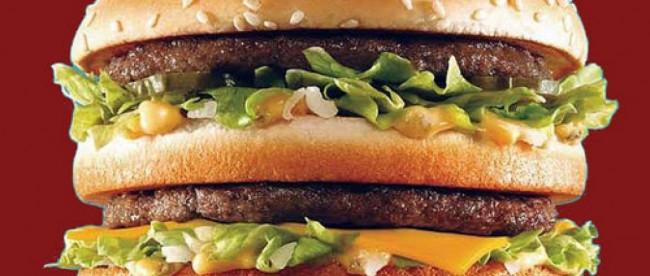Big Mac’ll Make You Jump Jump

Two all beef patties. Special sauce. Lettuce. Cheese. Pickles. Onions. On a sesame seed bun. Those words were first penned by an advertising agency in the mid-1970s and then set to music. They’re lyrics, charitably speaking, and for many, immediately recognizable ones at that. Those are the words to McDonald’s advertising jingle in support of the Big Mac, its iconic hamburger. If you’ve listened to the radio enough over the last forty years, you’ve certainly heard those words.
Delivering those words to your ears, though — that can be expensive. A radio ad can cost an advertiser a few hundred or even a few thousand dollars for a 30-second spot. And we all know that one ad won’t do very much — advertisers need to buy lots of ads before the message resonates with would-be customers. Expressing the virtues of all-beef patties and special sauce requires an enormous ad budget.
Or maybe some rap artists.
In March of 2005, McDonald’s ad team came up with a neat idea — lots of radio mentions at discount prices. They planned to achieve without buying ad time from stations, and without waiting for a commercial break. Advertising Age explained the offer: The message would be embedded into songs. Rappers were invited to write lyrics which included a positive reference to the Big Mac but in a way which met the artist’s style. (In the words of the ad exec working for McDonald’s, the rappers were allowed to “creatively bring to life the product in their song.”) And every time a radio station played the Big Mac-boosting song, McDonald’s would fork over a bit of money — up to $5 for each airplay. It’s a win-win: cheaper radio plays for McDonald’s, more money for artists.
But no one got rich on the scheme. The first problem was the public reaction to the campaign. When news of it broke, many consumer groups complained that many listeners (and children in particular) would not be able to recognize that the music was, in fact, a paid product promotion. McDonald’s, though, didn’t seem to care too much — they pushed ahead with the plan, aiming to “have a handful of songs flogging Big Macs on the air by summer,” per an MTV report.
But as September rolled around, there were no Big Mac anthems on the airwaves — despite interest from a number of (unfortunately undisclosed) rappers. A subsequent MTV story explained why: the artists weren’t promised any money up front — they only got paid if their song played on the radio — and the rappers weren’t given nearly as much control over their songs as they expected. McDonald’s insisted on approving all lyrics in each song, not just the ones mentioning the Big Mac. A McDonald’s spokesperson told MTV, in spin-heavy terms, that this proved difficult: “We are open to ideas to positively reflect our brand but we have not yet identified the match that we’ve been looking for.”
The program died a quiet death shortly thereafter.
 Bonus Fact: What’s in the Big Mac’s special sauce? It’s not a secret. In fact, in 2012, Dan Coudreaut, the fast food giant’s executive chef and vice president of culinary innovation, took to YouTube to answer that very question. In the video, available here, he uses mayo, sweet pickle relish, yellow mustard, white wine vinegar, garlic powder, and onion powder.
Bonus Fact: What’s in the Big Mac’s special sauce? It’s not a secret. In fact, in 2012, Dan Coudreaut, the fast food giant’s executive chef and vice president of culinary innovation, took to YouTube to answer that very question. In the video, available here, he uses mayo, sweet pickle relish, yellow mustard, white wine vinegar, garlic powder, and onion powder.
From the Archives: Max the Knife: Why it’s hard to find a Big Mac in some areas of Sweden.
Take the Quiz: Who makes it: McDonald’s or Burger King?
Related: McDonald’s Big Mac Bobble Head. He has a Big Mac for a head.
